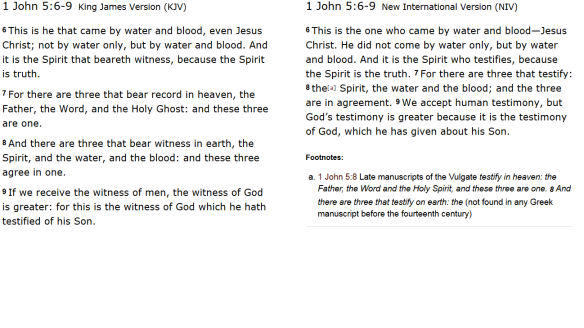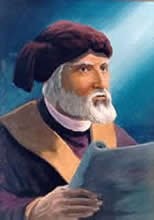A common objection from some of my muslim friends is that the doctrine of the Trinity stems solely from one place in the Bible – 1 John 5:7.

In the King James version (KJV) of the Bible – there is a piece of text which is super trinitarian in its implications – except it shouldn’t be there. That’s why it is in the KJV as above but not in the New International Version (NIV) or most others for that matter. Many though not all Muslims think that this piece of text, this verse, is the sole reason Christians declare that God is Triune – Three co-eternal and co-equal persons in the one being of God. This is a strong objection.
Let’s think about that argument and it’s implications. It would mean that in the earliest centuries to support the errant teaching of the Trinity idea – someone inserted this bogus text into the Holy Bible. No insertion into the text and there would have been no Trinity and certainly no scriptural warrant for being trinitarian. But the argument goes, it was inserted and that’s why we have the doctrine of the Trinity.
But this is simply not the case. The verse no where to be seen in any greek text, appeared in the body of the text no earlier than the 15th century and only as a margin note – a schema of understanding, a devotional piece some time before that. No where near the earliest centuries of the church. And the understanding of the divinity of the Son and the Spirt was emerging very early on in the christian community, being described at the end of the second century using the word Trinity. No where near the time of this textual insertion.

For source click the image
And another thing I am a trinitarian Christian because I seek to read the whole Bible fairly and carefully and I actually can’t say I have ever read this so called ‘only verse that leads to the Trinity understanding’. Go figure. No bogus verse and yet trinitarian.
See Dr. Dan Wallace’s scholarly treatment of this issue below or click here
“5:7 For there are three that testify, 5:8 the Spirit and the water and the blood, and these three are in agreement.” ‑‑NET Bible
Before τὸ πνεῦμα καὶ τὸ ὕδωρ καὶ τὸ αἷμα, the Textus Receptus reads ἐν τῷ οὐρανῷ, ὁ πατήρ, ὁ λόγος, καὶ τὸ ἅγιον πνεῦμα, καὶ οὗτοι οἱ τρεῖς ἕν εἰσι. 5·8 καὶ τρεῖς εἰσιν οἱ μαρτυροῦντες ἐν τῇ γῇ (“in heaven, the Father, the Word, and the Holy Spirit, and these three are one. 5:8 And there are three that testify on earth”). This reading, the infamous Comma Johanneum, has been known in the English-speaking world through the King James translation. However, the evidence—both external and internal—is decidedly against its authenticity. Our discussion will briefly address the external evidence.1
This longer reading is found only in eight late manuscripts, four of which have the words in a marginal note. Most of these manuscripts (2318, 221, and [with minor variations] 61, 88, 429, 629, 636, and 918) originate from the 16th century; the earliest manuscript, codex 221 (10th century), includes the reading in a marginal note which was added sometime after the original composition. Thus, there is no sure evidence of this reading in any Greek manuscript until the 1500s; each such reading was apparently composed after Erasmus’ Greek NT was published in 1516. Indeed, the reading appears in no Greek witness of any kind (either manuscript, patristic, or Greek translation of some other version) until AD 1215 (in a Greek translation of the Acts of the Lateran Council, a work originally written in Latin). This is all the more significant, since many a Greek Father would have loved such a reading, for it so succinctly affirms the doctrine of the Trinity.2 The reading seems to have arisen in a fourth century Latin homily in which the text was allegorized to refer to members of the Trinity. From there, it made its way into copies of the Latin Vulgate, the text used by the Roman Catholic Church.
The Trinitarian formula (known as the Comma Johanneum) made its way into the third edition of Erasmus’ Greek NT (1522) because of pressure from the Catholic Church. After his first edition appeared (1516), there arose such a furor over the absence of the Comma that Erasmus needed to defend himself. He argued that he did not put in the Comma because he found no Greek manuscripts that included it. Once one was produced (codex 61, written by one Roy or Froy at Oxford in c. 1520),3 Erasmus apparently felt obliged to include the reading. He became aware of this manuscript sometime between May of 1520 and September of 1521. In his annotations to his third edition he does not protest the rendering now in his text,4 as though it were made to order; but he does defend himself from the charge of indolence, noting that he had taken care to find whatever manuscripts he could for the production of his Greek New Testament. In the final analysis, Erasmus probably altered the text because of politico-theologico-economic concerns: he did not want his reputation ruined, nor his Novum Instrumentum to go unsold.
Modern advocates of the Textus Receptus and KJV generally argue for the inclusion of the Comma Johanneum on the basis of heretical motivation by scribes who did not include it. But these same scribes elsewhere include thoroughly orthodox readings—even in places where the TR/Byzantine manuscripts lack them. Further, these KJV advocates argue theologically from the position of divine preservation: since this verse is in the TR, it must be original. But this approach is circular, presupposing as it does that the TR = the original text. Further, it puts these Protestant proponents in the awkward and self-contradictory position of having to affirm that the Roman Catholic humanist, Erasmus, was just as inspired as the apostles, for on several occasions he invented readings—due either to carelessness or lack of Greek manuscripts (in particular, for the last six verses of Revelation Erasmus had to back-translate from Latin to Greek).
In reality, the issue is history, not heresy: How can one argue that the Comma Johanneum must go back to the original text when it did not appear until the 16th century in any Greek manuscripts? Such a stance does not do justice to the gospel: faith must be rooted in history. To argue that the Comma must be authentic is Bultmannian in its method, for it ignores history at every level. As such, it has very little to do with biblical Christianity, for a biblical faith is one that is rooted in history.
Significantly, the German translation done by Luther was based on Erasmus’ second edition (1519) and lacked the Comma. But the KJV translators, basing their work principally on Theodore Beza’s 10th edition of the Greek NT (1598), a work which itself was fundamentally based on Erasmus’ third and later editions (and Stephanus’ editions), popularized the Comma for the English-speaking world. Thus, the Comma Johanneum has been a battleground for English-speaking Christians more than for others.
Unfortunately, for many, the Comma and other similar passages have become such emotional baggage that is dragged around whenever the Bible is read that a knee-jerk reaction and ad hominem argumentation becomes the first and only way that they can process this issue. Sadly, neither empirical evidence nor reason can dissuade them from their views. The irony is that their very clinging to tradition at all costs (namely, of an outmoded translation which, though a literary monument in its day, is now like a Model T on the Autobahn) emulates Roman Catholicism in its regard for tradition.5 If the King James translators knew that this would be the result nearly four hundred years after the completion of their work, they’d be writhing in their graves.














